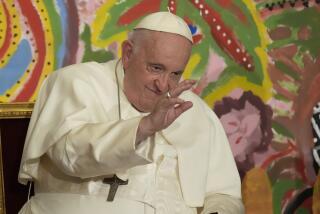Chernenko Ill, Cancels Talks, Greeks Report
- Share via
MOSCOW — A Greek government spokesman said Tuesday that a meeting between Soviet President Konstantin U. Chernenko and Greek Prime Minister Andreas Papandreou was canceled with only a few hours’ notice because Chernenko was ill.
But officials of the Soviet Foreign Ministry said there had been no plans for such a meeting and that Chernenko was vacationing outside the city. The officials said they could not comment on Chernenko’s health.
Today, Chernenko will complete his first year as leader of the Soviet Union, amid increasing uncertainty about the state of his health. His absence from public view for almost seven weeks has stirred speculation that the Kremlin will soon be faced with another transition, to a third leader in a little more than two years.
Despite Tuesday’s reiteration of the official statement that Chernenko is away on vacation, other Soviet officials have been quoted as saying that Chernenko, 73, is seriously ill. Still, as recently as last week, Tass, the Soviet news agency, reported that he was back in Moscow and had appeared before the Politburo to deliver a speech.
Dmitrios Maroudas, the Greek government spokesman, raised new doubts Tuesday about Chernenko’s condition when he told reporters:
“I can tell you that the planned meeting of the prime minister of Greece with the general secretary of the Communist Party of the Soviet Union did not take place due to the illness of Mr. Chernenko.”
Tass did not report this statement in its account of Maroudas’ briefing. And the main evening television news program here took the unusual step of showing a photograph of Chernenko in connection with an item about his new book on the development of socialism.
When Chernenko came to power, four days after the death of Yuri V. Andropov in 1984, he was described as a transitional figure. Andropov had taken over after the death of President Leonid I. Brezhnev, in November, 1982.
Emphysema Reported
From his earliest days in office, it seemed clear that Chernenko’s health was not good. Some analysts said he suffers from a serious lung condition, emphysema by at least one account.
Andropov seemed to galvanize ordinary Soviet citizens with his dramatic campaign against corruption and laziness, but Chernenko has had no such impact. His most notable contribution may be a decision to enter new arms control negotiations with the United States, which are scheduled to begin March 12 in Geneva. But even that decision, some observers think, may have been the product of collective leadership rather than personal initiative.
On the domestic front, Chernenko has had few such accomplishments. So far as internal politics and the economy are concerned, a Western diplomat remarked not long ago, his term “has largely been marking time.”
Not a single appointment to the party’s ruling Politburo has been made in Chernenko’s time, although the body’s membership is at its lowest level in many years, and six of its 11 members are older than 70.
‘Sense of Drift’
This could reflect Chernenko’s relative weakness as a leader, or the strength of possible successors who want to delay any appointments until they can bring their influence to bear.
“There is a sense of drift and deadlock at the top,” a Western diplomat said.
And a young Soviet university graduate said, “It’s been a year of stagnation, just like the last years of Brezhnev.”
Few Soviet citizens and no outsiders know what will happen when Chernenko goes, but many Western diplomats believe that Mikhail S. Gorbachev is most likely to take over. At 53, he is the youngest member of the ruling elite, and he has virtually been designated as heir apparent through a series of important assignments.
Grigory V. Romanov, 62, is regarded as the only likely alternative to Gorbachev for the leadership.
More to Read
Sign up for Essential California
The most important California stories and recommendations in your inbox every morning.
You may occasionally receive promotional content from the Los Angeles Times.










